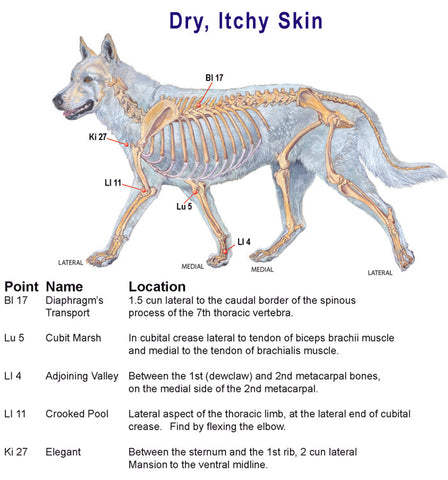Not only do too many dogs have allergy issues, there are so many different types of allergies that react to offending environmental substances, called allergens. Though dogs exhibit allergic reactions in a variety of ways, there are only five types of allergies: contact, flea, food, bacterial, and inhalant. The most common allergen type is inhalant, or atopy (pronounced “at-ta-pee”). And often, these allergies occur during the spring and fall when tree, grass, and weed pollens are most prevalent.
Watching and hearing your dog scratch incessantly is very disturbing and it means that your dog is allergic to something. The first step is to have your dog checked by your wholistic veterinarian to be sure it is an allergic reaction and to see what recommendation he or she may have. The vet will be able to help you sort the possible irritant(s) to which your dog’s body is reacting. The solution may be as simple as introducing or increasing omega fatty acids, vitamins A, E, Zn, and Biotin, a form of B vitamin, into your dog’s diet. These are natural supplements that serve as a first line of defense commonly offered for skin issues. Additionally, if the dog’s skin is damaged, your vet will most likely provide a topical application to address a potential bacterial infection.
If you are able to identify the specific allergen or allergens to which your dog is reacting, doing your best to avoid the allergen(s) is a logical part of the health regime. Examples of alergens include: household cleaning chemicals, fertilizers, snow melting substances, pollens, bug bites, plants, specific foods or treats especially those with preservatives and coloring, etc.
Ancient Medicine Approach
Traditional Chinese Medicine (TCM) takes a long-term approach to allergic responses toward foreign substances. From a Chinese medicine perspective, allergies are a breakdown in the immune system. That is, the body is not able to cope with a particular allergen because the immune system is not strong enough or over-reacts to the foreign substance. It is only when the natural, internal balance that supports the animal’s defenses is compromised can external, environmental agents lead toward a dog experiencing allergic reactions. Thus, it is extremely important to build and strengthen the dog’s immune system while also resolving the current pathogenic issue that is compromising the dog’s immune system.
A Chinese medicine guided approach to working with allergies that affect the skin is well-rounded and involves the animal’s lifestyle. His lifestyle requirements include: being sure that the food the dog is eating is appropriate for him; that he is getting enough rest and exercise; and, that his social needs are being met. Add acupuncture and acupressure along with Chinese herbs and you will have a multi-pronged approach to resolving the current condition and strengthening the dog’s immune system to prevent further allergic reactions.
Learn the acupressure protocol and point locations!
Skin Allergy Prevention
As the dog’s guardian, you can help your dog by building the dog’s immune system to get beyond the current condition and continue to prevent future allergies. There are four acupressure points you can work that are known to stimulate and strengthen the immune system. The acupressure points, also called “acupoints,” are as follow:
Large Intestine 11 (LI 11), Pond in the Curve – Enhances the immune system, reduces itching (pruritus), and benefits skin disorders.
Large Intestine 4 (LI 4), Adjoining Valley – Used for allergic dermatological issues and benefits the immune system.
Lung 7 (Lu 7), Broken Sequence – Benefits skin issues, especially abdominal itching, and strengthens the immune system.
Stomach 36 (St 36), Leg Three Mile – Helps prevent allergies. Additionally, this point is used to enhance the movement of energy and blood throughout the dog’s body to support good health.

Stimulating these four acupoints every fourth or fifth day can help your dog resolve current reactions and avoid skin allergies in the future. Combine this regime with your wholistic veterinarian’s recommendations, a balanced lifestyle, along with minimizing or eliminating exposure to the offending allergens and you will have gone a long way to making your dog comfortable in his skin.
Common Indicators of Allergic Skin Reactions:
- Itching / Scratching
- RashesRubbing face and eyes
- Chewing
- Loss of hair
- Open sores / Infections
- Discolored skin
- Toughened skin
- Dry, flaky skin
- Chronic ear infections

